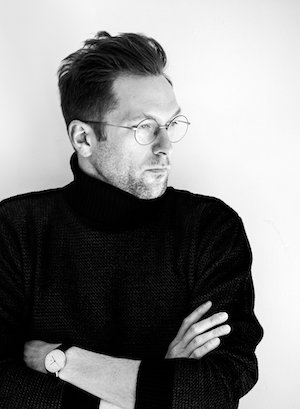With climate change burned into today’s zeitgeist, more and more composers are deriving inspiration from the natural world and the threats it faces. Riverside Choral Society presented the New York premiere of a major new work of this ilk, The End of Rain by Scott Ordway, at Lincoln Center’s Alice Tully Hall on Thursday night. The piece is a kind of oratorio for choir, soloists, and orchestra (in this presentation a minuscule one) with a libretto derived from statements by people who experienced the devastating California wildfires of recent years.
Eyewitnesses to Conflagration
Ordway is also a multimedia artist, and he accompanies the music with his own black and white photos and videos. Rather than depicting the fires and their aftermaths, these comment somewhat obliquely on the events, the circumstances, and the reflections of 225 Californians whose input the composer solicited. The very first images we see are of sprinklers watering fields, suggesting the influence of drought on the severity of fire seasons.
The images enhance the music, but for the most part the music could stand on its own. In Part 1, “Emergency,” incantatory thrumming underlies the chorus’s recitation of a list of “the things we lost in the fire.” This starts with basics like “My clothing,” “My home,” “Your artwork,” and builds to the more abstract “I lost the sense that / This place is heaven.” It climaxes with the soloists chiming the bells of tragedy and loss: “I lost all I had left of my husband: / His uniform / His medals / The flag from his casket. / I lost the bed we shared.”

A section called “Ash” proceeds like a resigned sigh, with a lovely wave-like descending melody. Mezzo-soprano Sylvia Leith then employed a soft buttery tone to sing in understated style the folk-like melody of “Flame,” ironically one of the points where I found myself getting a bit bored despite the sweetness of Leith’s voice.
Things picked up with the intense “This is what we miss,” where to a solemn drumbeat the soloists and chorus gradually chase a major scale upward with voices skillfully layered. The piece ends effectively with a subdued repeat of the last line, “I want to stay here,” from the lower voices.
The Lay of the Land
Part 2, “Pastoral,” includes photos and videos of farms – and lots of grazing cows. An odd time signature juices the first section, which catalogues the crops local people grow (or grew). Droning cellos and bass and shimmering violins breathed a calm, twinkling atmosphere for the peaceful harmonies of the next section, “This is the land we see around us,” which, for me, went on for too long.
One of the most compelling sections followed. Ms. Leith, soprano Sonja DuToit Tengblad, and baritone Harrison Hintzsche, all in superb voice, joined forces with the choir (and the cows, fortunately silent) to evoke everyday life in the conversationally phrased “These are the things we used to do.” The strings – a handful of violins and violas, two cellos, and one bass were the only instrumentation save percussion – supported the singers with penetrating, indecisive chords, ending by weaving around a steady yet somehow panicky sustained note from a cello crying above its normal range much like the voice of a person in a frenzy of terror.
The rising scale of “This is what we miss” found its reflection in the soprano solo at the start of Part 3 (“Requiem”). The soloists each then took parts of the dirge-like “This is how the land looks today” with flowing harmonies from the strings underneath.
The piece concludes with the duel declarations “We must change now” and “Things will grow back.” The section begins with the lower voices in a prayer-like mode then slowly builds, adding the full choir and soloists, to a hopeful finish.
Music and Nature
Throughout The End of Rain the tiny orchestra played with precision and sensitivity, and the soloists shone. The chorus sang with conviction and, as conducted by Patrick Gardner, with measured dynamics that sailed and drifted as the music demanded.
That wasn’t quite the case in the piece that opened the concert, John Luther Adams’ Night Peace. This drowsy meditation on a simple four-note motive paints a gentle landscape with a palette based mostly on a contemplative minor-seventh chord. I usually enjoy Adams’ music, but this performance was marred by halting entrances and pitch problems.

Night Peace is accompanied by harp and percussion. So it was interesting that the choir sounded a good deal better without instrumental backing tones to fix on in the a cappella next piece, Kasar Mie La Gaji by Venezuelan composer Alberto Grau, a composer new to me.
I really liked this piece. It too is built on a simple melodic line, this one haunting and beseeching. The entire text is the title phrase, which means “The Earth is tired” in what the composer notes is a language of Africa’s Sahel region (but doesn’t specify which people or what language). With questioning glissandos, dissonances, handclaps and footstomps, and intriguing sectional back-and-forths, it creates a hypnotic aura. After building to a frenzy it lapses into an eerie slow section with deep bass harmonies that brought Eastern Orthodox liturgical music to mind.
Kasar Mie La Gaji is over 30 years old, but its ecological message is more relevant than ever and reflected by many composers today. Scott Ordway’s The End of Rain is a major addition to that canon. Many contemporary works flower with a world premiere and then are never heard from again. It’s good to see that a meritorious work like this one has some momentum. Roomful of Teeth gave the world premiere in July 2022 at the Cabrillo Festival of Contemporary Music. Let’s hope it will be heard in yet more places as wildfires continue to intensity in years to come.
For more on the Riverside Choral Society visit its website.
 Blogcritics The critical lens on today's culture & entertainment
Blogcritics The critical lens on today's culture & entertainment




